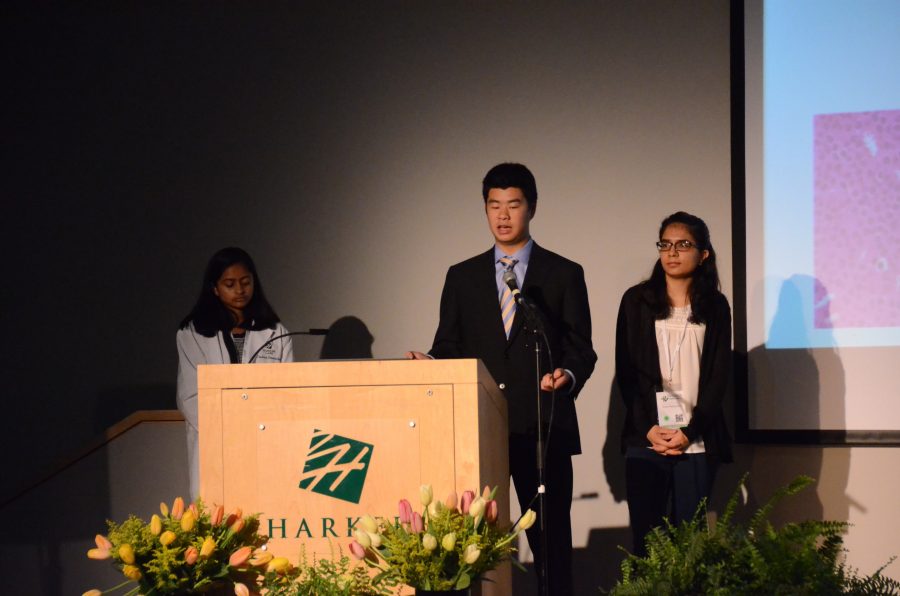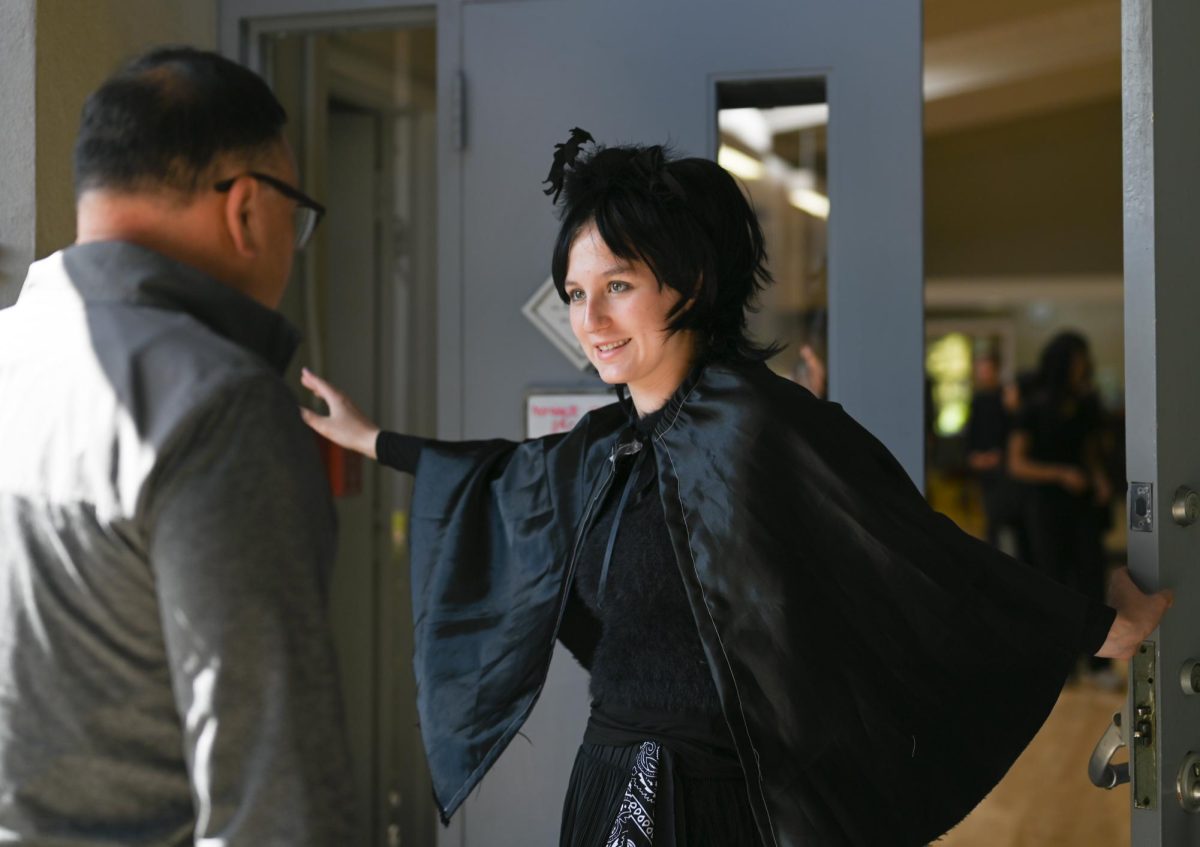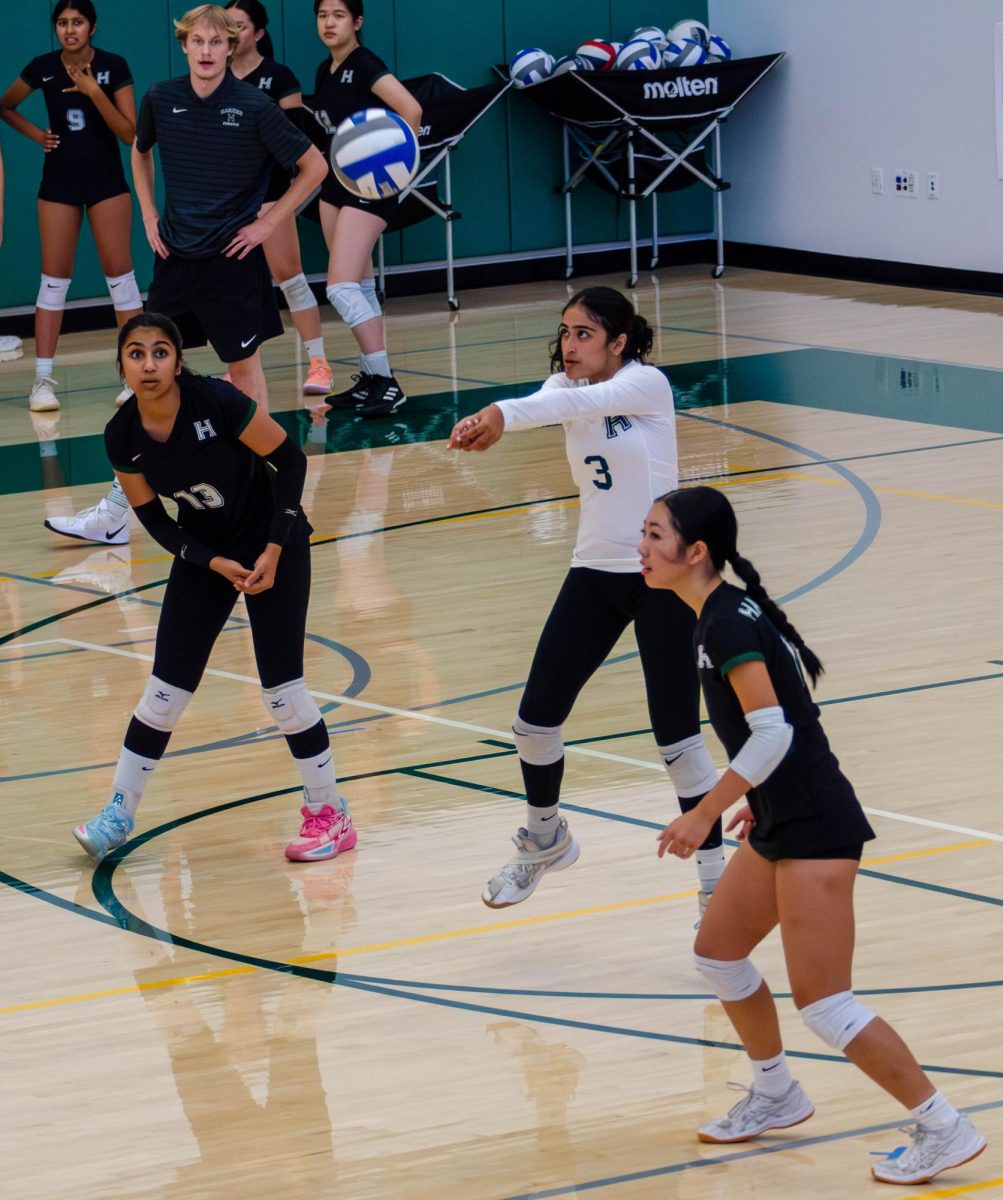Students submit Siemens Competition research papers
Regional finalists David Zhu (12) and Evani Radiya-Dixit (12) present their Siemens project at last year’s research symposium as moderator Richa Bhattacharya (11) looks on. David and Evani were two of 97 regional finalists last year.
September 24, 2016
Students submitted research papers for the Siemens Competition, a national contest focused on independent science research, this Tuesday.
The competition offers high school students the opportunity to conduct independent research, report their findings and receive feedback from practicing scientists.
“The Siemens Competition encourages students to understand and complete the entire research cycle,” Upper School Science Department Chair Anita Chetty said. “I look at it more as a learning process than ‘will I win a prize,’ because not everyone can win. I think the real prize is having the opportunity to go through what a real, practicing scientist would do.”
Many participants conducted their research over the summer in labs, where they received guidance from mentors who were familiar with their project topic.
“My project has to do with the analysis of retinal scans and the diagnosis of eye disease, so I worked with ophthalmologists dealing with the sorts of diseases [that I was researching],” senior Rishab Gargeya said. “I asked for a lot of guidance in understanding the biological implications of these diseases.”
The Upper School science department also offered to pair students with Harker science teachers, who would serve as mentors and edit students’ papers during the writing process.
Junior Michael Kwan conducted his research in the University of California Santa Cruz’s linguistics lab, while also using Harker resources to help him write his paper.
“Using the past winning papers and advice supplied by Harker, all of my problems and struggles could be solved relatively well,” Michael said. “It resulted in a better paper than I could have written myself.”
A panel of scientists who are chosen by the competition will judge the papers and decide on 300 projects that will advance to the semifinal round. From there, ten projects will be chosen from each of six geographic regions to be regional finalists. Regional finalists will present their projects virtually to a panel of judges.
“Presenting our project was a lot of fun and also challenging since it was virtual and we were simply speaking to a camera,” Evani Radiya-Dixit (12), one of last year’s regional finalists, said. “We had to make sure that we were effective and clear with the way we spoke since there were no in-person interactions.”
This year’s semifinalists will be announced on Oct. 18, and regional finalists will be announced the day after.


















![“[Building nerf blasters] became this outlet of creativity for me that hasn't been matched by anything else. The process [of] making a build complete to your desire is such a painstakingly difficult process, but I've had to learn from [the skills needed from] soldering to proper painting. There's so many different options for everything, if you think about it, it exists. The best part is [that] if it doesn't exist, you can build it yourself," Ishaan Parate said.](https://harkeraquila.com/wp-content/uploads/2022/08/DSC_8149-900x604.jpg)




![“When I came into high school, I was ready to be a follower. But DECA was a game changer for me. It helped me overcome my fear of public speaking, and it's played such a major role in who I've become today. To be able to successfully lead a chapter of 150 students, an officer team and be one of the upperclassmen I once really admired is something I'm [really] proud of,” Anvitha Tummala ('21) said.](https://harkeraquila.com/wp-content/uploads/2021/07/Screen-Shot-2021-07-25-at-9.50.05-AM-900x594.png)







![“I think getting up in the morning and having a sense of purpose [is exciting]. I think without a certain amount of drive, life is kind of obsolete and mundane, and I think having that every single day is what makes each day unique and kind of makes life exciting,” Neymika Jain (12) said.](https://harkeraquila.com/wp-content/uploads/2017/06/Screen-Shot-2017-06-03-at-4.54.16-PM.png)








![“My slogan is ‘slow feet, don’t eat, and I’m hungry.’ You need to run fast to get where you are–you aren't going to get those championships if you aren't fast,” Angel Cervantes (12) said. “I want to do well in school on my tests and in track and win championships for my team. I live by that, [and] I can do that anywhere: in the classroom or on the field.”](https://harkeraquila.com/wp-content/uploads/2018/06/DSC5146-900x601.jpg)
![“[Volleyball has] taught me how to fall correctly, and another thing it taught is that you don’t have to be the best at something to be good at it. If you just hit the ball in a smart way, then it still scores points and you’re good at it. You could be a background player and still make a much bigger impact on the team than you would think,” Anya Gert (’20) said.](https://harkeraquila.com/wp-content/uploads/2020/06/AnnaGert_JinTuan_HoHPhotoEdited-600x900.jpeg)

![“I'm not nearly there yet, but [my confidence has] definitely been getting better since I was pretty shy and timid coming into Harker my freshman year. I know that there's a lot of people that are really confident in what they do, and I really admire them. Everyone's so driven and that has really pushed me to kind of try to find my own place in high school and be more confident,” Alyssa Huang (’20) said.](https://harkeraquila.com/wp-content/uploads/2020/06/AlyssaHuang_EmilyChen_HoHPhoto-900x749.jpeg)










